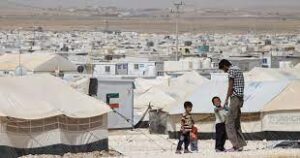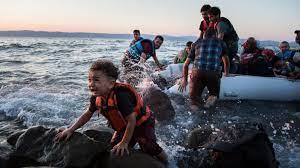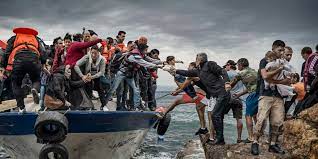The global refugee crisis is a complex and multifaceted issue that requires a concerted effort from governments, civil society organizations, and individuals alike. One crucial aspect of this crisis is immigration policies, which play a significant role in shaping the way in which refugees are received and integrated into host communities.
At its core, the refugee crisis is driven by conflict, persecution, and other forms of violence and instability that force people to flee their homes and seek safety elsewhere. According to the United Nations High Commissioner for Refugees (UNHCR), there were 26.4 million refugees worldwide at the end of 2020, with an additional 4.1 million asylum seekers waiting for their claims to be processed.
Immigration Policies in various countries
Many countries have implemented various immigration policies aimed at managing the flow of refugees and providing them with support and protection. These policies can take many forms, from resettlement programs and humanitarian visas to stricter border controls and deportation measures.
One of the most effective ways to address the global refugee crisis is through resettlement programs, which provide refugees with the opportunity to start a new life in a safe and secure environment. Under these programs, refugees are selected for resettlement based on a variety of criteria, such as their vulnerability, family ties, and skills.
Resettlement programs are typically run by governments, with support from international organizations and civil society groups. The UNHCR plays a key role in coordinating resettlement efforts and providing guidance and support to countries that participate in these programs.
Despite the benefits of resettlement programs, they are often subject to political opposition and can be difficult to implement on a large scale. Many countries are reluctant to take in refugees, citing concerns about the economic, social, and cultural impact of large-scale migration.
To address these concerns, it is important to engage with host communities and provide them with the support and resources they need to successfully integrate refugees into their societies. This can include language classes, job training, and other forms of assistance that help refugees build new lives and contribute to their new communities.
Another important aspect of immigration policy is the provision of humanitarian visas, which allow refugees to enter a country temporarily for humanitarian reasons. These visas are often granted on a case-by-case basis and can be used to provide immediate protection and support to refugees in urgent need.

immigration policies in addressing the global refugee crisis
Humanitarian visas can be particularly effective in situations where refugees are in danger and need to be evacuated quickly. For example, during the Syrian refugee crisis, many countries offered humanitarian visas to Syrian refugees who were stranded in dangerous or overcrowded refugee camps.
In addition to resettlement programs and humanitarian visas, immigration policies can also play a role in preventing the refugee crisis from worsening in the first place. This can include measures such as conflict prevention and resolution, human rights protection, and support for development and stability in refugee-producing countries.
For example, by investing in education, healthcare, and infrastructure in countries affected by conflict and displacement, governments can help to reduce the root causes of the refugee crisis and create more stable and prosperous societies.
However, addressing the global refugee crisis requires more than just immigration policy. It also requires a commitment to human rights, international cooperation, and a shared sense of responsibility for the well-being of all people, regardless of their nationality or background.
One of the most important aspects of this commitment is the principle of non-refoulment, which prohibits countries from returning refugees to a country where they are at risk of persecution or harm. This principle is enshrined in international law and is a fundamental part of the protection of refugees and other vulnerable people.
Non-refoulment is particularly important in situations where refugees are fleeing from countries with poor human rights records or where they face persecution based on their race, religion, or political beliefs. By providing refuge and protection to these individuals, countries can help to prevent further displacement and
contribute to a more just and humane world.
However, non-refoulment is not always respected, and many refugees continue to face the risk of forced return or deportation. This is often due to political pressure or a lack of resources and capacity to provide adequate protection and support to refugees.
To address these challenges, it is important for countries to work together and share responsibility for protecting refugees and other vulnerable populations. This can include measures such as burden-sharing agreements, increased funding for refugee support, and more effective coordination between governments, international organizations, and civil society groups.
In addition to these measures, it is also important to address the root causes of the refugee crisis by promoting peace, security, and human rights around the world. This can involve supporting initiatives such as conflict prevention, peacebuilding, and development assistance in refugee-producing countries.
Ultimately, addressing the global refugee crisis requires a comprehensive and integrated approach that involves a range of stakeholders and strategies. Immigration policies play a crucial role in this effort, but they must be part of a broader set of measures aimed at promoting protection, support, and dignity for refugees and other vulnerable populations.
By working together and committing to these goals, we can help to create a more just, equitable, and compassionate world, where all people have the opportunity to live in safety and dignity, regardless of their background or circumstances.
Moreover, it is important to recognize the contributions that refugees can make to their host communities and to the wider world. Refugees often bring valuable skills, experiences, and perspectives that can enrich the societies in which they settle.

For example
many refugees are highly educated and skilled professionals who can contribute to the economy and society in a variety of ways. By providing them with the support and opportunities they need to succeed, countries can help to tap into this potential and create more diverse and inclusive communities.
In addition to economic and social benefits, refugee integration can also have broader political and cultural implications. By promoting diversity, tolerance, and understanding, refugee integration can help to build more resilient and cohesive societies that are better equipped to address the challenges of the 21st century.
However, achieving these goals requires a long-term and sustained commitment to refugee protection and support. It also requires a willingness to challenge stereotypes and prejudices about refugees, and to recognize the common humanity that unites us all.
conclusion
Immigration policies play a crucial role in addressing the global refugee crisis, but they must be part of a broader set of measures aimed at promoting protection, support, and dignity for refugees and other vulnerable populations. By working together and committing to these goals, we can help to create a more just, equitable, and compassionate world, where all people have the opportunity to live in safety and dignity, regardless of their background or circumstances.











